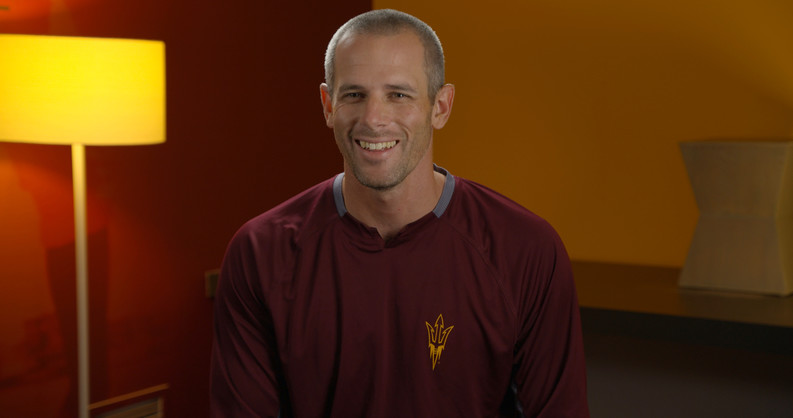Q&A: Arizona State assistant coach Ben Greenspan recounts first time he saw Hunter Bishop, the junior's breakout season in Tempe
Editor's note: Below is an edited Q&A with Arizona State baseball assistant coach and recruiting coordinator Ben Greenspan, who has worked closely with Hunter Bishop, the subject of a recent "Our Stories" feature. See more of the talented baseball star's story during the debut of "Our Stories" on May 5th at 5:15 p.m. PT/ 6:15 p.m. MT on Pac-12 Network.
Pac-12 Networks: Do you remember the first time you saw Hunter? What impressed you from a recruiting baseball perspective?
Ben Greenspan: It was a showcase in Stockton, California. He was a late add on there. He showed up in a different shirt than everyone else. The first thing they did was run a 60. He ran like a 6.5 at the showcase even with his height. I remember asking, ‘Who was that just ran that 6.5?’ They said, ‘That’s Hunter Bishop. He’s a pitcher.’ I remember thinking to myself, not anymore. He did that and hit balls all over the field during BP with serious bat speed. I remember thinking to myself, ‘Wow. This is a good one that nobody has committed yet.’ That’s what started it for us, that tryout.

P12N: What are the signs of maturity you see from him?
BG: His maturity as a baseball player first — how he handles everything is completely different than his freshman year. He’s such a good kid, and he’s so willing to be coached. I think he has shrunk his circle of input a little bit. Instead of trying to be something else, he’s become the best Hunter Bishop he can be — instead of trying to be this player or this player. He’s found a swing that works for him, and he’s stuck to it. To me, that’s maturity. He’s matured, not only at-bat to at-bat but pitch-to-pitch. I thought that early in his career, one bad pitch could take him out of the at-bat. Now, it’s re-focus, control your emotions and get back into the at-bat. That is a significant improvement.
And off the field, the maturity in how he carries himself, he’s a professional in his approach. He understands the work that needs to go into it. He puts in the work. He’s grown up.
Our next home run derby at ASU will have to include @HunterBishop9.
The @ASU_Baseball junior increased his NCAA lead in homers and recorded a .647 OBP in the Sun Devils' first sweep of Arizona since 2009.
Bishop is the #Pac12BSB Player of the Week. https://t.co/Fc8LH8PUCh pic.twitter.com/ODMXdiqWZT
— Pac-12 Network (@Pac12Network) April 1, 2019
P12N: Is it fair to say this is completely a breakout year for him?
BG: Absolutely. His freshman year, I think he hit about .300. It was amazing for him. We joke about it, having like 20 different batting stances and still hitting .300 is pretty impressive. That’s how physically gifted he is. Now, what he’s doing this year is impressive a year is as anything I’ve seen in my coaching career. It’s a breakout year from a power standpoint but even more so from a consistency standpoint of doing it every night.
P12N: The Golden Spikes semifinalists list came out recently, and Hunter was included in it. Was that a surprise here in Tempe?
BG: No, he’s always had the tools. He’s always had the ability. I think for him, whether he was going to figure it out here or in professional baseball, I think it was a matter of time. That’s why he got the at-bats he did as a freshman and a sophomore. Did I know it was coming? No. I don’t think anyone could have predicted the year where he’s arguably a first-half Player of the Year. But deep down, everyone knew he was capable of doing something like that.
